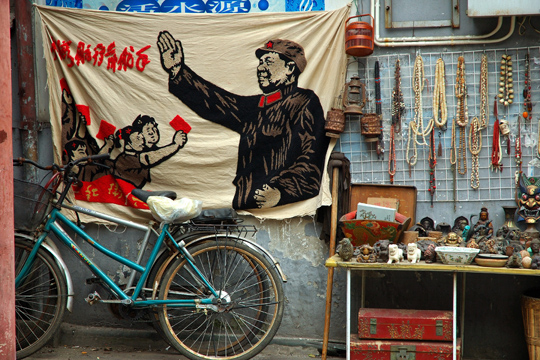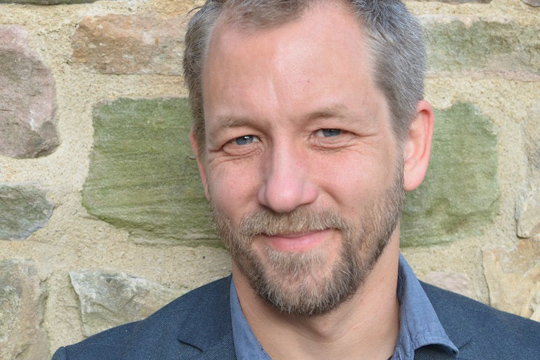Dictatorship and Historical Justice
Freiburg, Apr 13, 2021
How can a country deal with the crimes committed by a dictatorship? The answers to this question often determine whether a society can find a new direction, or whether it will be torn apart by social conflicts. Another problem is that not every downfall of a dictatorship necessarily leads to a new democratic beginning. But can a dictatorial regime address the crimes committed by the state when these were committed in its name? This is the question Prof. Dr. Daniel Leese, a professor of Chinese Studies at the University of Freiburg, explores in his book “Maos langer Schatten” (Mao’s Long Shadow) about the period of change in China after Mao Zedong’s death in the mid-1970s. He and his team received the renowned ERC Starting Grant from the European Research Council for their project. His book has also just been nominated for the German Non-Fiction Prize. Jürgen Reuß talked to Leese about the consequential historical decisions made after the Cultural Revolution and how these have influenced the path China as the new superpower is on today.

The omnipresent shadow: The personality cult of Mao Zedong still lives on today in many memorabilia. Photo: TMAX/stock.adobe.com
Mr. Leese, let me ask you an obvious question: Are the crimes committed by a dictatorial regime only dealt with when the dictatorship is over?
Daniel Leese: That’s undoubtedly true in general. There’s a kind of standard model now for coming to terms with historical injustice followed by democratization. This model works with an instrument best described by the term “transitional justice,” which includes a variety of measures for addressing the legacy of past human rights violations and for reconciliation in society. One example is the South African Truth and Reconciliation Commission.
South Africa went through a process of democratization, but the People’s Republic of China?
What’s interesting about the example of China is that, while a number of mechanisms similar to those in South Africa were applied after Mao’s death, they weren’t intended to overcome the party’s dictatorship after coming to terms with historical injustice; the goal was rather to consolidate it. It was about a careful balancing act regarding the contradiction of how a dictatorial regime can address the injustices it has caused without the rule of the party collapsing.
What’s the benefit of coming to terms with these crimes, if the dictatorial regime doesn’t collapse?
That’s a question of perspective. From the point of view of those affected, in many cases they were surely more interested in the state dealing with the concrete injustices they suffered, rather than the abstract question of the form of government. Our research showed that the party changed after Mao’s death and became more of a welfare dictatorship. The old issues of class struggle were quietly put to rest, and millions of injustices were symbolically rehabilitated. A few people also received material reparations. By settling individual claims, the party prevented protest movements from being organized. It also used each case of rehabilitation as an opportunity to blame past events on the “evil Gang of Four” led by Mao’s wife Jiang Qing. However, they did not legalize the right to rehabilitation, and cases of organized resistance were quenched.
Was there a brief time when a different China seemed possible after Mao?
In my book, I also talk about the policies of Hu Yaobang, who later became secretary general and stands for the attempt to establish a model for democratic socialism in the People’s Republic of China. He symbolized a different kind of China, but he was ousted after meeting resistance from within the party in early 1987. His death in April 1989 sparked the protests at Tiananmen Square.
Attempts to democratize the country were tolerated for over a decade?
It was a very complex situation. Because of the Cultural Revolution, many members in the party elite actually wanted to establish more democratic decision-making principles and a model for socialist legality, but actual questions regarding limiting the party’s special role and the status of the law were very controversial. Some older party officials wanted to go back to the 1950s, while other people in the party and within society demanded not just social and economic change, but political reforms as well. This tension lasted throughout the 1980s, making it a very fascinating decade.

For the last ten years, Daniel Leese and his team acquired documents from archives that have closed, used bookstores, and private collections.Photo: Daniel Leese
Why didn’t Mao, who was a charismatic leader, transfer his charisma to a successor, as dictators like to do?
He tried, but he couldn’t find a suitable candidate. The secretary of defense Lin Biao died in a plane crash in 1971, and as to the members of the “Gang of Four,” Mao didn’t think that they would be able to unite the entire party. At the same time, he put Deng Xiaoping on track to succeed Zhou Enlai as prime minister, but in the year before he died, the two had a falling out because Deng didn’t agree with his view of the Cultural Revolution. Shortly before his death, Mao decided to put all his stakes on Hua Guofeng, who was a representative of the younger generation but is all but forgotten today. However, what made him a legitimate successor was a small note from Mao saying, “If you take over, I can rest assured.”
Was that enough?
The remaining party leaders quickly elected Hua Guofeng to all the important positions. He even had more power than Mao on paper. Yet he lacked long-term support from older party officials and he wasn’t nefarious enough to assert his claim to power at any price. However, the ability to openly discuss reforms in the party after Mao Zedong’s death is mainly his doing, although this has been forgotten today, especially because Deng Xiaoping portrayed him as being opposed to reforms. A major point of criticism was Hua’s personality cult, which Mao built up for him. The party came to the fundamental consensus that the dangers of an excessive leadership cult were too great for the unity of the party. For them, it should never again be possible for one man to mobilize the people against the party, like in the Cultural Revolution.
So there is no leadership cult in China anymore?
The fundamental consensus lasted one generation, even though all party leaders from Deng to Hu Jintao built up limited cults. Xi Jinping has now gone back to some of Mao’s principles, in a way. He uses personality cult aggressively as a means to secure his power against diverging tendencies in the party and the state. The lessons learned from the Cultural Revolution, which then served as a foundation for all party leaders who came after, is increasingly fading from memory.
You were able to save many documents from oblivion with your book.
“Save from oblivion” sounds so dramatic. During the last ten years, we painstakingly acquired most of the documents from archives that had closed, used book stores, and private collections. These documents included the personal files of people from that time, journals and notebooks, and party training materials. As to the latter, in 1979 alone, 600,000 people were working on the historical revisions of cases, and all of them had to be trained accordingly. We put some of these documents in a database to show exactly how historical justice was understood and applied. This was only possible because I had such an excellent team. On top of that, we searched about two dozen state archives and conducted many interviews. Nowadays, unfortunately the official party line is that this kind of research is “historical nihilism” because it doesn’t follow its standards of interpretation.
At least this indirectly shows that your research is regarded as relevant.
That’s one way of looking at it. We knew from the beginning that it was a politically controversial topic. I’m very grateful to the European Research Council for their generous funding of this project. Thanks to our research and database, we’re now globally recognized. As a result, everyone involved has been able to find a great position, even before the end of the project, including one assistant professorship in Berkeley in the US and even a position in the People’s Republic of China. I see this as the greatest recognition of our work.

